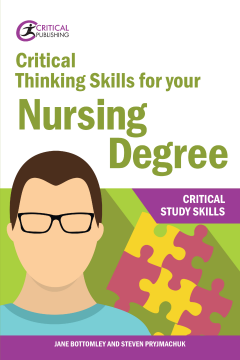
Additional Information
Book Details
Abstract
Critical Thinking Skills for your Nursing Degree provides you with a sound knowledge and understanding of:
- the nature of critical thinking, and of its relevance and importance in HE
- how to adopt a critical approach to all aspects of your nursing study
- the importance of active, critical reading, and how it allows you an efficient, principled, effective assessment of the literature in your field
- the need to adopt a critical approach to writing, characterised by analytical and evaluative use of sources and the development of your own ‘voice’
If you are embarking on a university nursing or midwifery degree, the books in this series will help you acquire and develop the knowledge, skills and strategies you need to achieve your goals. They provide support in all areas important for university study, including institutional and disciplinary policy and practice, self-management, and research and communication. Tasks and activities are designed to foster aspects of learning which are valued in higher education, including learner autonomy and critical thinking, and to guide you towards reflective practice in your study and work life.
Jane Bottomley is a Senior Language Tutor at the University of Manchester and a Senior Fellow of the British Association of Lecturers in English for Academic Purposes (BALEAP).She has been involved in the development of a number of content-based academic study skills courses at the University of Manchester and has previously published on scientific writing.
Steven Pryjmachuk is Professor of Mental Health Nursing Education in the School of Health Science's Division of Nursing, Midwifery and Social Work at the University of Manchester and a Senior Fellow of the Higher Education Academy. His teaching, clinical and research work has centred largely on supporting and facilitating individuals – be they students, patients or colleagues – to develop, learn or care independently.
In December 2014, Steven was elected as vice Chair (2015-16) and Chair (2017-18) of Mental Health Nurse Academics UK, an organisation representing 65 Higher Education Institutions providing education and research on mental health nursing.
Table of Contents
| Section Title | Page | Action | Price |
|---|---|---|---|
| Cover | Cover 1 | ||
| Half-title | i | ||
| Series information | ii | ||
| Title page | iii | ||
| Copyright information | iv | ||
| Table of contents | v | ||
| Acknowledgements | vi | ||
| Meet the authors | vii | ||
| Introduction | viii | ||
| A note on terminology | ix | ||
| Chapter 1 The foundations of critical thinking | 1 | ||
| Fake news! | 6 | ||
| Discussion of task | 7 | ||
| Developing and applying your critical thinking skills | 9 | ||
| Critical thinking in nursing practice | 10 | ||
| Discussion of task | 10 | ||
| Applying critical thinking to ethical issues | 12 | ||
| Discussion of case study A | 12 | ||
| Discussion of case study B | 13 | ||
| References | 15 | ||
| Chapter 2 Reflective practice | 17 | ||
| Reflection and reflective practice | 17 | ||
| Reflective frameworks | 18 | ||
| Borton’s model of structured reflection | 18 | ||
| Gibbs’ reflective cycle | 19 | ||
| Johns’ model of structured reflection | 20 | ||
| Critically evaluating reflective frameworks | 21 | ||
| Reflection in action and reflection on action | 22 | ||
| Reflection on learning | 23 | ||
| Clinical supervision | 23 | ||
| Writing reflectively | 24 | ||
| Short written reflections | 24 | ||
| Discussion of task | 26 | ||
| Longer written reflections and essays | 27 | ||
| Discussion of task | 29 | ||
| The language of reflection | 30 | ||
| Discussion of reflective language analysis | 30 | ||
| References | 35 | ||
| Chapter 3 Critical reading | 37 | ||
| Selecting sources for an assignment | 37 | ||
| Selecting credible sources | 38 | ||
| Selecting relevant sources | 39 | ||
| Discussion of tasks | 43 | ||
| Engaging critically with sources | 44 | ||
| Scrutinising | 44 | ||
| Synthesising | 45 | ||
| Telling your research story | 45 | ||
| Discussion of task | 47 | ||
| References | 48 | ||
| Chapter 4 Critical writing | 49 | ||
| What does it mean to write critically? | 49 | ||
| References | 58 | ||
| Appendix 1: Academic levels at university | 59 | ||
| Appendix 2: Verb forms in English | 60 | ||
| Further reading | 61 | ||
| Answer key | 62 | ||
| Index | 70 |
